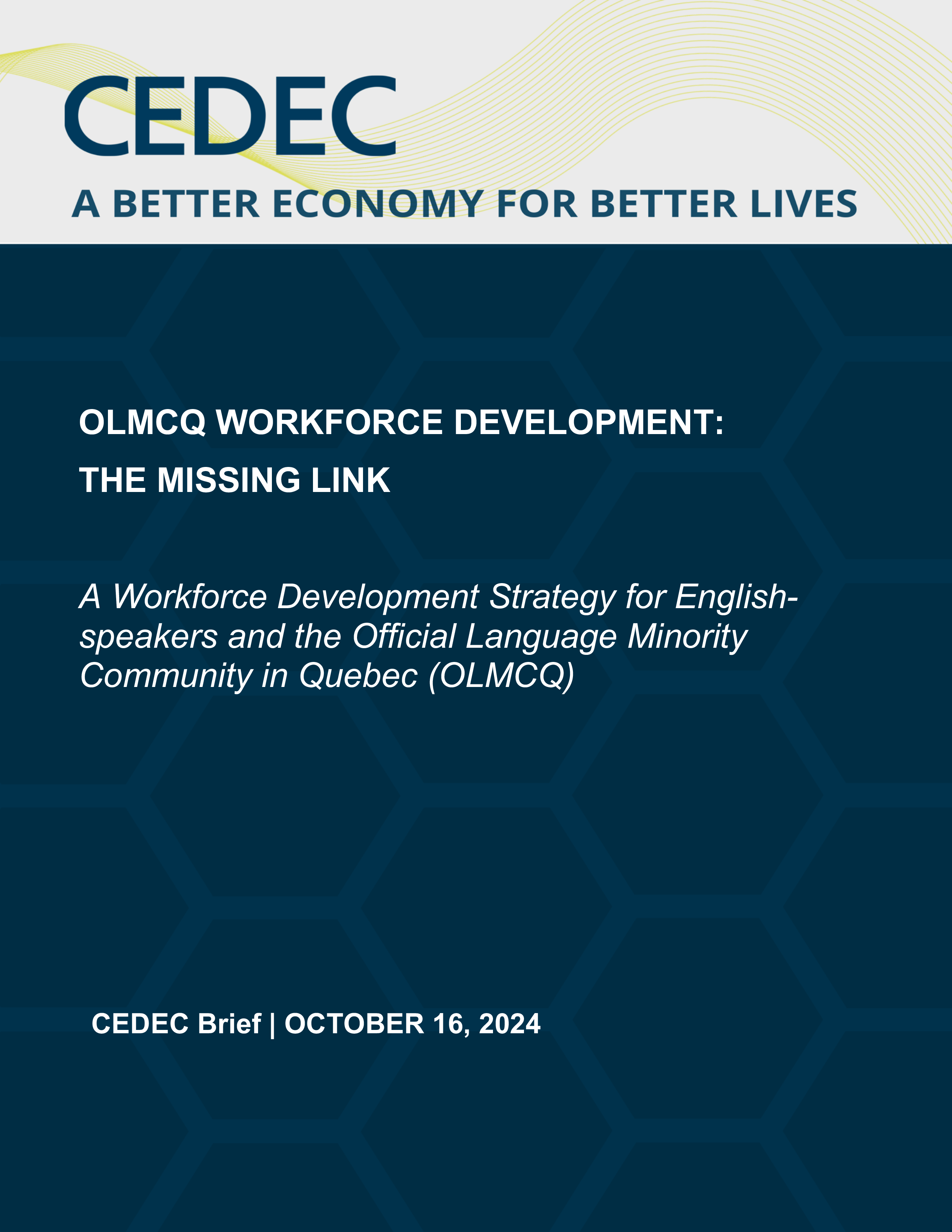OLMCQ Workforce Development: The Missing Link
Workforce development is about equipping the people of today’s and tomorrow’s workforce with the knowledge and know-how they need to take advantage of career and work opportunities emerging in the economy.
Workforce development is a critical component of economic development. Workforce development provides the labour the private, public, and civil society sectors of our economy need today and tomorrow to produce the tangible and intangible services and products we all depend on to live and to thrive. As such, it plays a pivotal role in fostering economic growth.
The people of today’s and tomorrow’s workforce must have life-long access to a continuum of knowledge and skills development supports. The purpose of such a life-long learning approach is to ensure workforce and worker resilience, i.e. the ability to constantly respond to the needs and the imperatives of a rapidly changing economy, characterized by a combination of known and unknown economic factors.
Economic development and growth, and the benefits it provides to people and communities, are reliant upon a skilled and adaptable workforce. In turn, successful workforce development depends upon a multifaceted strategy focused on creating and delivering responsive, timely, connected, and coordinated workforce development programs to specific population groups. Such solutions require active collaboration across the private, public, and civil society sectors of our economy, including: (a) secondary and post-secondary institutions; (b) skills developers and trainers; (c) employment service providers; (d) employers, unions and industry representatives, and; (e) community leaders and groups.
A General Overview
According to Statistics Canada, 1,611,375 Quebec residents (19.2% of the population) or one-fifth of the population spoke English regularly at home in 2021.
- 1,088,820 Quebec residents (13.0% of the population) had English as their only first official language spoken and 329,515 residents (3.9%) had both English and French as their first official languages spoken.[1]
- 1,452,285 workers living in the province (35.4%), or one-third of Quebec’s workforce used English at least regularly at work, including all those who used English most often at work.
- 798,795 people used English most often at work in 2021, predominantly or equally with other languages, accounting for 19.5% of the province’s workers.
- 798,795 people used English most often at work in 2021, predominantly or equally with other languages, accounting for 19.5% of the province’s workers.
- Among workers who used English at least regularly at work, many worked in professional, scientific, and technical services (188,300 people, or 13.0%), retail trade (158,980 people, or 10.9%) or health care and social assistance (155,700 people, or 10.7%).
- Among workers who spoke English most often at home, predominantly or with other languages, 89.2% also used English regularly at work.
- Most of the people (72.1%) who used English regularly at work lived in the Montréal CMA.
English-speakers are involved in all aspects of Quebec’s workforce. They participate in full time and part-time work, and participate in professional, scientific, and technical industries, as well as the retail, manufacturing, health care, and social assistance sectors.
Sixty-five percent of English mother tongue workers in Quebec regularly use French at work.
As a population group, English-speakers face specific challenges that have been well documented over the past ten years, i.e., they experience higher unemployment rates across the province and earn a lower median income than the general population in Quebec.
[1] Please see Statistics Canada https://www150.statcan.gc.ca/n1/pub/89-657-x/89-657-x2023016-eng.htm
The Development of a Collaborative English-speaking Talent Management Supply Chain Strategy
No matter the lens applied, a well-prepared and highly participative English-speaking workforce with the necessary knowledge, know-how, and language skills is essential to growing Quebec’s economy and developing a healthy Quebec society.
A well-educated and skilled English-speaking workforce is a key contributor to economic growth in Quebec.
The OLMCQ has a number of local, regional, and provincial community assets to support the development of the English-speaking workforce, including a highly developed primary, secondary, post-secondary, vocational, and adult-education school system, complemented by various training, skills development, and employment assistance services.
What the OLMCQ does not have, and what it needs is the development, implementation, and effective coordination of a future-oriented, English-speaking Workforce Development Strategy that effectively helps English speakers take full advantage of the employment opportunities available in Quebec’s economy, while also equipping them to shift and adapt to changing economic realities across the province. This strategy must provide English-speakers with access to:
- Timely and relevant demographic and labour market information, including language proficiency requirements for specific jobs.
- A continuum of knowledge, skills development, and employment assistance service supports throughout their lifetime.
Evidently, no one economic development or community development actor working alone can address the future workforce development needs and aspirations of English-speakers in Quebec.
CEDEC’s CALL TO ACTION in this Brief is to emphasize the imperative for the OLMCQ to address the important missing link of workforce development for English-speakers across Quebec, an English-speaking Talent Management Supply Chain Strategy.
The Principles of an English-speaking Talent Management Supply Chain Strategy
A forward-looking, multi-year, and innovative English-speaking Talent Management Supply Chain Strategy which enables English-speakers to take full advantage of a constantly changing economy in Quebec should be based upon the following principles.
- Alignment with economic development plans and priorities.
- In the case of the OLMCQ, this would mean lining up workforce development up with the ESCQ Ten-Year Economic Development Plan focused on (a) strengthening the community’s contribution to the growth of Quebec’s economy, while (b) leveraging this contribution to address economic disparities experienced by the community.
- In the case of the OLMCQ, this would mean lining up workforce development up with the ESCQ Ten-Year Economic Development Plan focused on (a) strengthening the community’s contribution to the growth of Quebec’s economy, while (b) leveraging this contribution to address economic disparities experienced by the community.
- Continual access to up-to-date local, regional, and provincial information about
- The English-speaking workforce and its demographic trajectory.
- The English-speaking workforce, including profiles of its knowledge and know-how.
- The labour market demands of Quebec’s economy, and the identification of those that can be best leveraged by English-speaking Quebecers.
- Language proficiency requirements for different types of jobs.
- The gaps that might exist between all of the above.
- Centering on worker career and skills development aspirations.
- Making critical connections between worker career and skills development aspirations and the reality of labour market demands within the province’s economy.
- Addressing short, medium, and long-term workforce development priorities.
- Combining formal and informal education, training, and skills development tracks, and emphasizing paid, on-the-job skills acquisition which leverage natural workflows.
Necessary Mechanisms to Successfully Implement an English-speaking Talent Management Supply Chain Strategy
To successfully develop the machinery and processes to support the implementation of an English-speaking Talent Management Supply Chain Strategy, CEDEC belies the following structures and programs must be put in place:
- An English-speaking Talent Management Supply Chain ECOSYSTEM.
Collaboration, which is at the heart of CEDEC’s mandate and mission, requires that different community actors and partners, who see opportunities and challenges from different perspectives, work together to identify creative workforce development solutions that go beyond any one actor’s limited vision of what is possible.
- Successful implementation of an English-speaking Talent Management Supply Chain Strategy will only be possible if different agents of economic development work together to respond to the workforce development needs, interests, and aspirations of English speakers and the Official Language Minority Community in Quebec (OLMCQ).
The above is particularly true with respect to connecting and coordinating employment assistance service delivery. Siloed approaches to programming and service delivery in this area are no longer desirable or acceptable. All employment assistance service delivery agents should be prepared to contribute to the collective strength of an English-speaking Talent Management Supply Chain. Such connections would also provide for a more collective and thoughtful expansion of employment assistance service operations across the province, especially in areas where there are obvious service gaps. - The Sharing of Workforce and Labour Market Development Information at the Community, Regional, and Provincial Levels
Shared information about the English-speaking workforce and its development, as well as the labour market demands of the Quebec economy, is absolutely essential if English speaking Quebecers, and the organizations and institutions serving them, are to work together to ensure that the English-speaking workforce can take full advantage of career and skills development and advancement opportunities in Quebec.
Information sharing would also facilitate the design and implementation of a more collaborative approach to workforce and labour market development research, which could be used to strengthen the coordination of a more effective English speaking talent management supply chain.
- A Provincial Talent Matching and Placement Service Across Quebec Capable of Operating at the Community, Regional, and Provincial Levels
Ensuring that English-speakers can take advantage of employment opportunities in their communities, regions, and across the province, as well as shift and adapt to changing economic realities, is critical to the success of an English-speaking Talent Management Supply Chain Strategy.
Such a talent matching and placement service across the province will be required to leverage technology to identify and share information about employment opportunities that take best advantage of the career and skills development aspirations of English-speaking workers in Quebec. This “by and for” provincial talent matching, and placement service will ensure an active search capacity aligned with the development of Quebec’s English-speaking workforce.
- Ongoing Performance Monitoring and Evaluation
The ongoing capturing and analysis of relevant workforce and labour market development data would enable the English-speaking Talent Management Supply Chain ECOSYSTEM to monitor progress against specific workforce development objectives and to make course corrections as required.
Such performance monitoring and evaluation practices would be able to consistently recommend innovative ways of adapting and evolving the design and delivery of the English-speaking Talent Management Supply Chain Strategy.
The development of an English-speaking Talent Management Supply Chain ECOSYSTEM and the effective implementation of an OLMCQ-wide Talent Management Supply Chain Strategy, based upon the principles and modalities outlined in this Brief, are particularly well-suited mechanisms for ensuring the optimal and future development of the English-speaking workforce in Quebec.
CEDEC believes federal departments and agencies can and must take positive measures to support the continuous and sustained advancement of the Official Language Minority Community in Quebec (OLMCQ). These measures must be provided directly to the OLMCQ and evaluated against clear “by and for OLMCQ economic development objectives and targets”.
Part VII of the Official Languages Act (OLA) obliges federal government departments and agencies to actively contribute to enhancing the vitality of the English and French linguistic minority communities across Canada (OLMCs), including the OLMCQ. Such obligations include actively supporting and assisting OLMC development and fostering the full recognition and use of English and French in Canadian society, including Quebec.
Making optimal use of the federal Government’s scarce Official Language funding resources will help maximize benefits for English speakers and the OLMCQ. This will require coordination and collaboration across the OLMCQ and between the OLMCQ and relevant federal departments and agencies.
It is CEDEC’s intention to continue to strongly advocate for the establishment of the enabling mechanisms outlined in this brief. They are essential for the ongoing and successful development of the English-speaking workforce in Quebec.


